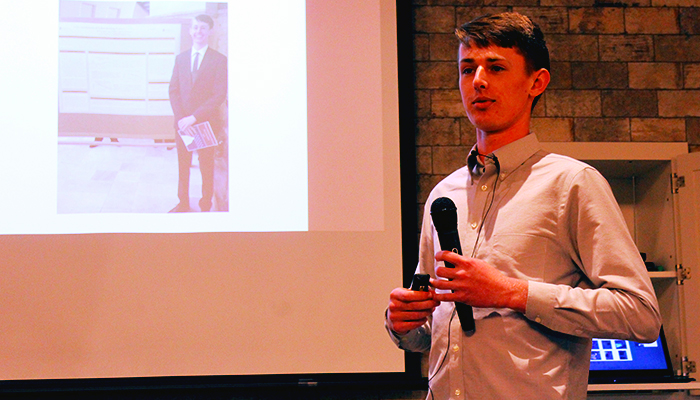Student finds method to control aphids without pesticides; study finds harassing Hispanic students about language affects self-esteem
By CRISTINA JANNEY
Hays Post
April’s FHSU Science Cafe focused on undergraduate research, including a study of water conservation by FHSU college students, non-pesticide management of aphids and the effects of language micro-aggressions on Hispanic students’ self-esteem.
The number of FHSU students performing undergraduate research has jumped dramatically in the last seven years, going from 200 in 2011 to 3,300 students in FY18, said Leslie Paige, director, office of Scholarship and Sponsored Projects.
Engaging students in undergraduate research increases student retention as well as helps the students prepare for graduate school or careers, Paige said.
The research has conducted pre and post studies of students as well as their mentors on communication, creativity, ethics, content knowledge, as well as other factors, and found increases in both students and and their teachers.
Water Conservation Among FHSU Students

Gini Weisar, 17, second-year KAMS student, conducted a study and found parental education was a significant factor that affected water conservation values among college students.
This was an expansion of a water conservation survey of Hays residents. Both off-campus and on-campus students were included in Weisar’s study.
“Parents put their input into their students’ water conservation education, such as saying, ‘Why are you brushing your teeth with the water on? You always take so much water. Why are you in the shower for two hours? Why do you need to use that much water?’ ”
School or community education efforts were also found to be significant factors for pro-conservation values. However, parental education showed more influence than school or community education.
“A lot of students did use some things as turning off the faucet while brushing their teeth, but most students, as you can probably expect, did not want to take shorter showers,” Weisar said.
Students also indicated they only washed full loads of laundry, but those who did not pay for water indicated they were less inclined to take water conservation efforts compared to off-campus students who paid their own water bills.
Democrats had higher water conservation values than Republicans.
The number of years the students had lived in Hays was also a factor that showed higher water conservation values.
“People coming into Hays might not know the water needs of Hays,” Weisar said. “They might not know that we are not on the Ogallala Aquifer or that we might not have as many resources as other parts of Kansas. They also might not be as financially or emotionally invested in the city.”
Weisar advocated for incentive programs that targeted landlords and encouraged parents to talk more to their children about water conservation.
Aphid Management Without Pesticides

Jacob Lutgen is a graduate of the KAMS program, which allowed him early entry to FHSU. He is applying to medical school this summer and will graduate FHSU in December. He investigated RNA interference of the xbox binding protein in aphids.
Pea aphids caused $14 billion in damage to crops in 2018 in the United States.
The aphids are managed primarily through insecticides and the introduction of predators, such as lady bugs.
“Insecticides obviously cause more harm than just the pea aphid, so we are looking at wether we can manage pea aphids without affecting other organisms to the extent they are currently affected,” he said.
The research looked at proteins that could result in the death of the aphids. The research hypothesis was that if you could inhibit a protein that affect the aphids response to stress that it could result in the death of the aphids.
In practice, a crop would be engineered that would express the double-stranded RNA needed to inhibit the protein in the aphids. The crop itself would be resistant to the pea aphid without having to spray it. The treatment should not have affects on the aphids’ predators, such as lady bugs, or to humans, Lutgen said.
Lutgen fed the double-stranded RNA to the aphids. At the highest concentration, the off spring were reduced by half. The treatment reduced the original aphid population by 30 percent.
“This to me confirmed that we are seeing a change in survival and we are affecting physiology in some way,” he said.
Lutgen recently received funding to continue research combining his treatment with that of a FSHU grad student’s to try to further reduce aphid survival.
Non-Spanish Speaking Hispanic Self-Esteem

Ginger Garcia presented “No Hablo Español: Do Language-related Micro-aggressions Negatively Influence Self-esteem Among Non-Spanish Speaking Hispanics and Latinos Individuals?”
Garcia, 20, also was in the KAMS program and is currently in the accelerated school psychologist program at FHSU. She will graduate with her B.S. in psychology in May.
When she was a child, Garcia was often asked if she spoke Spanish. She does not. She also was accused of not being Hispanic because she did not speak Spanish. She met a fellow Hispanic student at a conference and learned he had similar experiences.
In second- and third-generation Hispanic households, there is often less knowledge of the Spanish language.
Garcia initiated a nationwide online survey that looked at language micro-aggressions, self-esteem as well as the strength of ethnic identity.
The study found the more language micro-aggressions the survey respondents experienced, the lower their self esteem. They did not find stronger ethnic identities meant stronger self-esteem, which was contrary to prior studies.
The non-speaking Hispanics reported three micro-aggression within the last six months. This was consistent regardless of region of the United States.
Garcia said she hoped future research will address why these micro-aggressions are happening and search for ways to help the non-Spanish speaking Hispanic population.
The next Science Cafe will be at 7 p.m. July 22 at the Venue at Thirsty’s. The lecture is titled “Footprints on the Moon: A Celebration of the 50th Anniversary of Apollo 11” presented by Dr. Paul Adams, dean of the College of Education.
